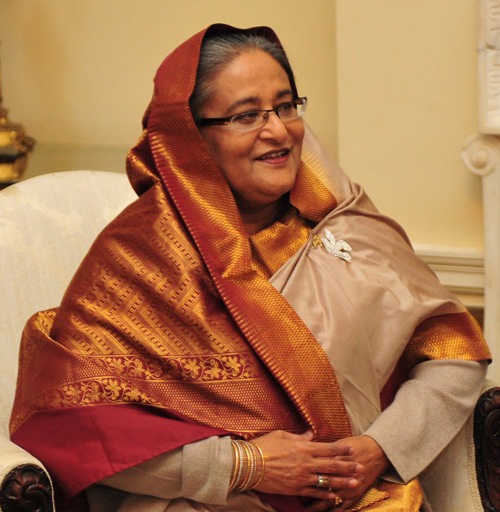Hasina bats for BRI, Indian anxiety goes up | Southasian Monitor
Afsan Chowdhury, January 25, 2019

“India is such a big country and economy, it should not worry about OBOR. Rather, it can also join so that all the countries can benefit economically,” Bangladesh Prime Minister Sheikh Hasina recently said in an interview to CNN-News18 television channel. Mentioning “Bangladesh-China-India-Myanmar Economic Corridor (BCIM-EC)”, an agreement to establish connectivity, Hasina said, “after signing that agreement, I think there is no reason to worry about the corridor for India,” Bangladesh’s Daily Star also reported.
As Indo-China rivalry cranks up in the region, Bangladesh sits close to the battlefield but is not a player. However, despite its not-so-nimble-footed diplomacy, it may be learning to cope a little better with the situation.
Hasina’s statement that Indian anxiety about BRI/OBOR is unfounded will certainly not make New Delhi happy.
Read Also: Bangladesh’s position on global terrorism index has improved: Australian agency CPES
Coming after an election in which India didn’t deny backing the PM’s Awami League to ensure policy continuity, Hasina’s statement may hurt Indian feelings. But India also knows that China has been banking on the same horse (Bangladesh) too. So, for all three, it’s a triangle of convenience, not love. Who will Hasina tilt to more and why?
India’s anxiety, China’s cash and Bangladesh
When it comes to China and BRI, most Indians think it’s a threat, so Bangladesh’s enthusiasm for it will rankle India. Sino-Indian rivalry is intense but lopsided against India due to the huge Chinese cash crop that is readily available and which India doesn’t have. And still, impoverished regional countries love money. So, in as much as South Asian states are in an asymmetric relationship with India, so is India as it fights a wealthy dragon called China.
India wants Bangladesh to refuse sanctuary to its northeast insurgents and ISI operatives. Dhaka has complied with both and that is precisely why New Delhi has consistently supported Hasina. Bangladesh, however, felt let down by India backing Myanmar on the Rohingya refugee issue and, of course, the perennial water-sharing dispute on which India hasn’t delivered.
China and India’s support to Myanmar has made both look less friendly to Bangladesh. This has, however, given Hasina more space to maneuver with perhaps none to call her “first among friends”.
The Bangladesh prime minister’s statement that India “as a big neighbour, which has good relations with the Myanmar government, can take some pragmatic initiatives, put pressure on Myanmar or discuss the matter with Naypyidaw so that the Rohingya can return to their country”, shows that she is not letting India off the hook. She knows that between the two, New Delhi is weaker and no matter what the Rohingyas do, China brings billions of dollars which is a big factor now.
Indo-Bangla anxiety
Bangladesh’s economic development, though not equitable, has continued robustly, which makes it more confident to look for other partners besides India.
Read Also: Bangladesh elections: A transitional moment in politics?
Hasina may also be interested in taking advantage of Prime Minister Narendra Modi’s political situation as India approaches parliamentary elections. The pushing out of Rohingyas, deporting illegal Bangladeshis from Assam are unpopular issues in Bangladesh, but which Modi needs to use politically. Bangladesh can do little about these except take advantage of the situation and sneak a bit closer to China despite its role in backing Rohingya ethnic-cleansing by Myanmar. Given that Bangladesh is a relatively helpless observer in the chapatti vs noodles war, it will try to play coy with both.
Diplomatic promiscuity, water sharing and sunset factories
In this strategy involving diplomatic promiscuity, India is at a slight disadvantage compared to China. India has a strategic stake in Bangladesh given that it shares international borders with Bangladesh and Pakistan while China has no such stake in Bangladesh. Pakistan’s ISI may well try to play the proxy war from Bangladesh which would worry New Delhi. And support to BRI by Bangladesh makes India more anxious, given China’s expanding clout and links with Pakistan. While India knows that Bangladesh hardly calls any of the shots, some shots may come its way anyway and that is worrying.
India will play hot and cold with the Teesta waters but Bangladesh is already gearing up for the long haul on this. Hasina has expressed unhappiness with Mamata Banerjee ‘didi, not Modi, and knows that the river waters will not flow into Bangladesh anytime soon. Luckily, Bangladesh’s hugely powerful business class is not interested in watering agro-fields much and won’t miss a touch of the dry.
What it wants is a share of China’s economic pie, a bit that has already arrived due to the US blockade. Many of the people who matter are hoping that Bangladesh will become China’s proxy economic zone for export to the West, as the home of sunset industries or the collateral beneficiary of the blockade.
India has to match that kind of benefits to retain its current clout. However, Nikkei news reports that President Xi Jinping may visit India in February-March to mend fences “in a move seen at countering Washington’s increasingly antagonistic trade policy and aggressive Indo-Pacific diplomacy”. More of everything on the way.
